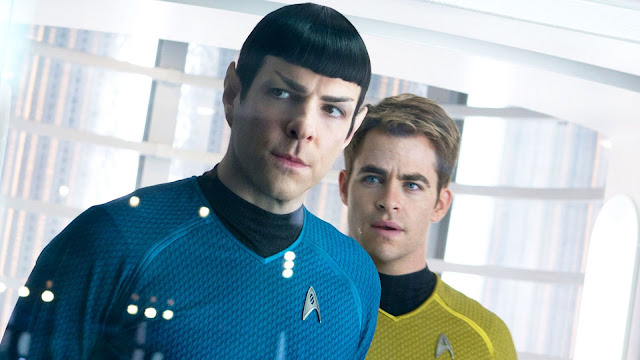Why Paramount Suspending Production On New 'Star Trek' Movies Was Inevitable
The return of Star Wars to gigantic box office success and the popularity of the TV shows Discovery and Picard mean Paramount's decision to suspend development of future Star Trek movies is very sensible
 |
| Zachary Quinto and Chris Pine in 'Star Trek' (CREDIT: Paramount) |
by Jack Linsdell
Star Trek is exactly the sort of IP that flourishes far better on the small screen than as a blockbuster movie franchise. The original Star Trek show may have flopped in NBC's ratings in 1966, but soon became a cult classic and worldwide phenomenon when it went through syndication in the 1970s. That made it the most popular show of the decade, one that would leave it's mark on pop culture forever. In 2017, Bryan Fuller and Alex Kurtzman's Star Trek: Discovery rode a wave of critical praise, Emmy nominations (and wins) and was so popular that it gave CBS All Access a record number of subscriptions. Patrick Stewart's recent Picard series (also for CBS All Access) then broke the record streaming views set by Discovery by more than 115%. This all proves that, on TV, Star Trek is still as popular as ever. However, the same can't be said for the various feature film series.
The original 1979 movie Star Trek The Motion Picture earned a respectable $139 million on a $45 million budget. Sure, Paramount made a small profit but it was far from the stratospheric box office LucasFilm earned from George Lucas's Star Wars: A New Hope two years earlier ($775 million on an $11 million budget). Before 2009, the only Trek feature to even surpass Robert Wise's classic was the 1996 Jonathan Frakes-directed sequel The First Contact with $150 million worldwide. When JJ Abrams launched his reboot trilogy in 2009, Star Trek "only" earned $385 million on a $150 million budget, with most of that ($257 million) coming from North America. Star Trek may have smashed it domestically but compared to other 2008 reboots like Indiana Jones and the Crystal Skull underwhelmed massively internationally. All this led folks to believe that Star Trek Into Darkness would become a "breakout sequel" in 2014, both with it playing in 3D (which was the IMAX of the day) and adding a red-hot Benedict Cumberbatch to the cast as the villain Khan. It didn't, earning a halfway decent $467 million, but on a too-expensive $190 million budget. This was a far smaller cume than the other big-budget space adventure of that year, namely Marvel and James Gunn's much-loved Guardians of the Galaxy ($772 million worldwide). When director JJ Abrams left the franchise to direct Star Wars The Force Awakens, Justin Lin stepped up to helm the third movie Star Trek Beyond. Released in 2016, the movie may have recieved decent reviews for it's darker tone, but bombed with only $343 million worldwide on a far too pricey $185 million budget. Blame the return of Star Wars the year before to record-breaking global grosses, or the fierce competition that year from other more responsibly budgeted franchise revamps/long awaited sequels (Jason Bourne, Ice Age Collison Course), but Beyond was a big commercial whiff for Paramount.
Heck, even the 1979 feature made $493 million worldwide when adjusted for inflation, and that was without all the modern graphics and technology that Beyond had available. All of this is a long way of saying that although making a little money for Paramount and being solid, character-driven popcorn movies with a fantastic cast, all Star Trek films have a ceiling ($300-400 million) and are unable to play to the masses in a way that Star Wars can.
So, is it any surprise that Paramount are sceptical about more Trek features? No, not really. And, the fact that only one of the three in-development projects was a sequel/continuation of Abrams' trilogy speaks volumes. The standard Star Trek 4 (a sequel to Beyond) was being planned with all the trilogy's cast returning including the likes of Simon Pegg and Zoe Saldana. At one point, female director SJ Clarkson was attached and would have been the first women to helm a Trek feature. But, when contract negotiations with two of the famous Chris's (Pine and Hemsworth) broke down, the movie hit a brick wall.
Project two was being lined up as "the 10th film by Quentin Tarantino", which caused the same amount of internet excitement as when the Pulp Fiction filmmaker was being lined up to make an R-rated version of Casino Royale in 2006. Penned by Mark L. Smith (The Revenant), this sure to be bloody and brutal film would have most certainly given the series a fresh and new direction. I'm not the biggest fan of Taratino's work, but he has many fans and I'm sure it'd been very entertaining. However, commercially speaking, even his films have a ceiling in the same bracket of the Trek franchise. Heck his highest grossing film Djanjo Unchained earned $425 million globally (about the same as Into Darkness) and even his recent Leonardo DiCaprio/Brad Pitt period drama Once Upon A Time In Hollywood "only" earned $374 million worldwide. Tarantino sure would have shaken things up with the franchise, but commercially speaking, him giving Paramount the feature film success and franchise expansion they wanted would have been a coin toss at best.
The final Trek project was another movie in a separate continuity to the Chris Pine/Zachary Quinto trilogy. Penned by Fargo creator/showrunner Noah Hawley, this movie had all the makings of being a very well-written flick, with excellent character work (as both the recent trilogy and Hawley excell best at this). But, it's whole "virus wipes out part of universe" plot gave Paramount cold feet because it would likely be considered too topical with the current pandemic crisis we're dealing with.
So, what's the answer? Paramount may have the right idea in postponing these three film projects. History shows that Star Trek will never be "appeals to the masses" outer space escapism in the way that Star Wars and Guardians of the Galaxy have become. Star Trek seems to work best with audiences and critics on the small screen, and the lack of profit that Paramount makes from producing rather expensive blockbuster Trek movies means that perhaps abandoning all future movie adaptions is a smart business move. Star Trek is known for it's popular characters not it's iconic and big scaled space action sequences. That makes TV the ideal place for the IP to best thrive.
In 2009, with Star Wars on a sabbatical and the rise of "hot" young stars like Chris Pine and Zoe Saldana, you can understand why the studio pursued a relaunch of the IP in a feature film format. But, in 2020, with high budget sci-fi series like The Mandalorian on Disney Plus approximating the production values of feature movies and the likes of Star Wars making a gigantic comeback makes Star Trek a devoid IP in film industry. And, for that reason, no matter how exciting a "Taratino does Star Trek" movie might be, Paramount's choice to suspend further development on the series' future is a sensible and frankly inevitable one.


Comments
Post a Comment